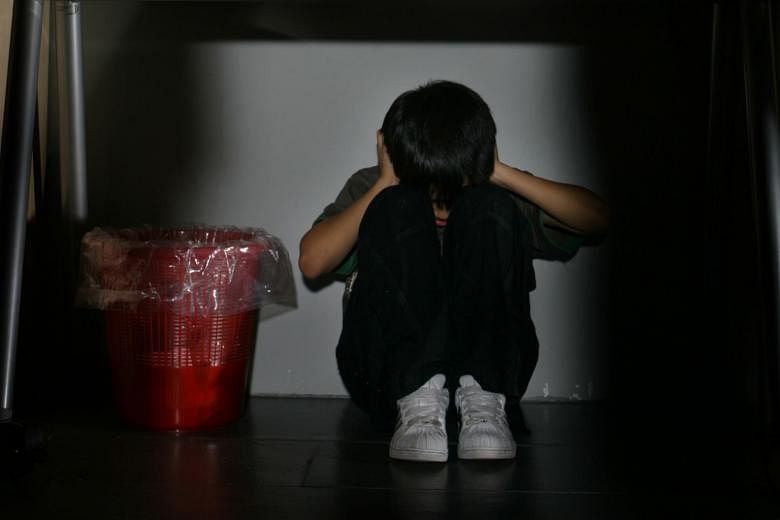Locked in a room without a heater in the cold of winter, having been beaten and not given enough to eat, Yua Funato cried and begged for her parents' forgiveness.
"Please, please, please forgive me. I will make sure I can do more things tomorrow than today without daddy and mummy having to tell me what to do," the five-year-old wrote in a diary entry, ostensibly blaming herself for her parents' abuse in a heart-wrenching plea that shocked Japan this year.
Her diary entries - which also include one that read, "I am sorry that I played so much like a fool. I will stop doing a foolish thing like playing." - were found after she died on March 2 from blood poisoning caused by pneumonia, which had been triggered by malnutrition.
She weighed just 12.2kg - the healthy weight of a two-year-old.
She had lived with her stepfather, Yudai, 33, and birth mother, Yuri, 26, as well as her one-year-old stepbrother who, in contrast, was doted on. Both parents, who were unemployed, were arrested.
Yua's case, which fell in between bureaucratic cracks after the family moved from Kagawa prefecture in central Japan to Tokyo, sparked a national backlash so severe that Prime Minister Shinzo Abe addressed it in Parliament, vowing to strengthen child abuse prevention measures.
Last week, a panel from the Ministry of Health, Labour and Welfare (MHLW) finalised draft measures that will form the basis for revising the Child Welfare Act.
One of the suggestions is to give staff at a network of 212 child welfare consultation centres nationwide more powers so that they can separate parents from children who are suspected to be at risk.
-
65,431
Number of child abuse cases last year that the police referred to child welfare consultation centres.
Separately, the Tokyo Metropolitan Government wants to go even further by banning the physical and verbal abuse of children altogether, in what is said to be the first prefectural law of its kind in Japan.
Tokyo Governor Yuriko Koike said of the Bill to be tabled in the metropolitan assembly in February: "Physical or verbal abuse, which some people say is a form of disciplining, can cause trauma to children and parents can go too far."
Yua's death has sparked a bout of national reflection as children are increasingly a precious resource in Japan, which is grappling with a plummeting birth rate.
But the child abuse situation has been worsening. MHLW data shows that in the fiscal year ended March, child welfare consultation centres handled 133,778 cases - the 27th straight year of increase and a 9.1 per cent jump from the corresponding period a year earlier.
Separately, police said they were called in for 65,431 cases of child abuse last year, which they referred to the child welfare consultation centres. This was the 13th straight annual increment and a 20.7 per cent rise from 2016.
But of these, only 1,116 ended up as criminal cases, the Justice Ministry said in a White Paper this month - though this was up 7.2 per cent from 2016. The low figure implies a reluctance by prosecutors to pursue criminal charges for child abuse cases.
Yua's case was referred twice by Kagawa prefectural police to prosecutors, but both times they did not press charges against Yudai.
Yua was also twice taken into custody by Kagawa child welfare officers, who had flagged her case file to their counterparts at the Shinagawa centre in Tokyo for a follow-up.
But the Shinagawa officers were turned away on Feb 9 during a house visit, with Yuri telling them that Yua was not at home.
The Mainichi newspaper said in an editorial that child welfare officers are overworked - the number of child abuse cases rose 3.3 times in the last 10 years, while the number of personnel increased only 1.5 times.
The government plans to add 2,000 more child welfare workers to its current 3,200 personnel by March 2023, though the newspaper said it was also urgent to address such cases as when "parents deny abuse and refuse to let their children be interviewed", or when children "deny they are abused because they want to protect their parents".
Dr Mayumi Taniguchi, a sociologist from Osaka International University, told The Straits Times that societal understanding of what constitutes child abuse has been rising, resulting in "more cases where the surrounding community feels compelled to raise their voices".
Dr Emi Kataoka from Komazawa University in Tokyo said many couples, who face financial constraints given stagnating wages, have come to see kids as a burden: "As they lose latitude in their finances, personal time and mental health, such mounting pressures can easily drive parents to child abuse."

